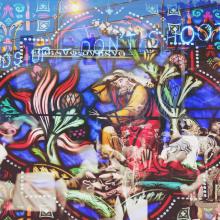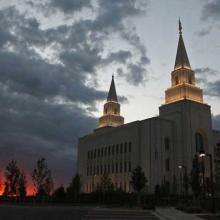Missouri
The current discourse around right-wing politics and religion has been focused on the phrase “Christian nationalism.” Christian nationalism is a catchall for a variety of beliefs that generally claim the U.S. is founded upon Christian ideas and that the country’s current laws ought to reflect those beliefs. Rep. Marjorie Taylor Greene (R.-Ga.) is perhaps one of the most well known politicians in the U.S. who identifies as a Christian nationalist, but, according to a survey done by Pew Research, “Eight-in-ten White evangelical Protestants (81 percent) say the country’s founders intended it to be a Christian nation.” Christian nationalism, as a term, is fine but imprecise. What we’re seeing from lawmakers, like those in Missouri but also in other states, too, is more properly defined as “Christofascism.”
Mildred rents the three billboards down the road from her house to cover with messages shaming the local police chief, Willoughby (Woody Harrelson) in hopes of galvanizing the department into action. She merely irritates the sympathetic Willoughby, but infuriates Dixon (Sam Rockwell), a dim officer with racist and homophobic tendencies and an anger management problem. As tensions escalate and anger begets violence (which begets more violence), Mildred and Dixon are each forced to address the deeper issues inside them that fuel their actions.
"I’m sad, I’m hurt, I’m mad,” the Reverend Clinton Stancil of the Wayman AME Church in St. Louis said by telephone. “But this was expected. We haven’t made any progress since Ferguson, that’s clear. Cops can still kill us with impunity."
The church’s predominately black congregation once mirrored the neighborhood’s demographics. But today hip and eclectic East Nashville, with its rising property values and trendy restaurants, draws white millennials, said the Rev. Morris Tipton Jr., the church’s pastor.
Given the neighborhood’s shift, is Tipton worried about the church’s future?
It may take years to fully grasp the import of the Supreme Court’s decision in Trinity Lutheran Church v. Comer, where the court ruled 7-2 that the state of Missouri had expressly and unjustifiably discriminated against a church by disqualifying it from receiving a public benefit (scrap tire to enhance playground safety) solely because of the church’s religious character.
But here are six initial observations about the ruling:
The Supreme Court has ruled for a Missouri church that claimed religious discrimination after it was refused state funds to improve its playground.
Ruling 7-2, the court on June 26 determined that the state had unfairly denied funds for Trinity Lutheran Church in Columbia under the First Amendment’s free exercise clause.
The case, which examines the limits of religious freedom under the U.S. Constitution, is one of the most important before the court in its current term. It also marks the biggest test to date for the court's newest justice, President Donald Trump's appointee Neil Gorsuch.
Neil Gorsuch, President Trump’s Supreme Court nominee, is known for his commitment to religious freedom and preventing government from discriminating against religious organizations and individuals.
If confirmed, the new justice could help sway a case that could be a landmark in American education, paving the way for public funds to go to private schools.
Huston Smith, the man who helped the world understand other faiths, perhaps more than almost anyone else, died on Dec. 30 at age 97.
I first learned of it when my oldest sister, who lives in Berkeley, Calif., not far from Huston and Kendra Smith, sent me a note saying he had breathed his last about 7:30, the morning of Dec. 1, at his Berkeley home.
I was surprised that it took until Jan. 1 for a news story to show up about the death of this remarkable religion scholar.

Jesse Hall, University of Missouri, Columbia. Adapated image via Adam Procter/Flickr
We have witnessed a remarkable series of events on the Columbia, Mo., campus of the University of Missouri this week. The university president and the chancellor of the Columbia campus resigned Nov. 9 in response to protests claiming that university leadership had failed to appropriately address and respond to a toxic racial climate on campus.
The recent racist incidents, which many students and faculty felt the administration had failed to confront, reveal a stunning lack of empathy for students of color at the university. They include: racial slurs hurled at a black student body president and a black student organization, and a swastika painted in human feces on the wall of a residence hall.
But these specific incidents merely allowed a long-simmering stew of disrespect, verbal attacks, and marginalization of students of color to come boiling to the surface.
The Columbia campus of the University of Missouri is only a two-hour drive from Ferguson, Mo. When Michael Brown was shot in August 2014, protesters took to the streets of Ferguson every night, and student activists from Mizzou were among them. They saw what standing up to entrenched institutional racism looked like, and they saw that victories could be won with non-violent protest.
Missouri Gov. Jay Nixon signed an executive action this afternoon declaring a state of emergency in Missouri and activating the National Guard to respond to “any period of unrest that might occur following the grand jury’s decision concerning the investigation into the death of Michael Brown.”
The Supreme Court’s decision to sit out the legal battle over same-sex marriage will — for now, at least — leave the future of laws prohibiting gays and lesbians from marrying in the hands of lower state and federal court judges. But it also almost certainly means the couples challenging those laws are more likely to win in the end.
The court said Oct. 6 that it would not hear appeals from five states whose same-sex marriage bans had been invalidated by lower federal courts. The decision, issued without explanation, will likely lead to recognition of gay marriages in 11 more states. It also allows an avalanche of legal challenges to the remaining bans to keep going forward in state and federal courts, where gay and lesbian couples have overwhelmingly prevailed.
The court’s decision leaves unchanged 20 state laws blocking same-sex unions. Each is already under legal attack, facing challenges in state or federal court, and sometimes both. Challenges to marriage bans already have reached a handful of state appeals courts and the federal appeals courts for the 5th, 6th, 9th and 11th circuits.
Some of those judges had been waiting to see what the Supreme Court would do. The court’s instruction Oct 6. was: Proceed.
“God has to be busy with everyone else. And hopefully he will come into my life. I hope it happens. It’s going to break my heart if it don’t.”
So says Andrew, one of the three teenage subjects of the documentary Rich Hill, currently playing in theaters across the country. While film refrains from any sermonizing on poverty, or any direct call to action from its audience, it’s mighty hard for socially minded Christians to hear these words and not feel compelled to react. Tracy Droz Tragos and Andrew Droz Palermo’s documentary is an unflinching portrait of poverty in rural America, and its sympathetic portrayals give heartbreaking examples of neighbors in need.
The film follows a year in the lives of three boys: Andrew, Harley, and Appachey. They don’t know each other, but they have much in common. Besides living in the small town of Rich Hill, Mo., all three come from troubled families living well below the poverty line. Andrew is the most hopeful of the group. He’s got a family he loves, and a father who means well, but whose unrealistic dreams keep the family moving from place to place and dodging unpaid bills. Thirteen-year-old Appachey and 15-year-old Harley, however, come from darker situations. Harley is a victim of sexual abuse (his mother is in jail for attempting to kill the man responsible), while Appachey’s violent behavioral issues are simply too much to handle for his single mom, overwhelmed with his siblings and a dilapidated house filled to the rafters with junk.
It’s been said that our politics are often shaped by what we see out the window.
Twenty years ago, if you would've asked me if I thought police treat people fairly regardless of race, I would have confidently said, “Yes” — just like 70 percent of white folks in the recent Pew survey. In fact, 30 years ago, if you would've asked me what I wanted to be when I grew up I’d have said “a policeman.”
I grew up in a small town in Tennessee, which was still very segregated. Growing up, we knew the police officers by name. On more than one occasion, the police saved the day, and countless news stories celebrated the heroism and courage of police officers.
My mom and I used to go on walks together in a park, and I always looked forward to bumping into the officer who patrolled the park. She was tough as nails but always greeted me with an enthusiastic smile and a big bear hug. At the age of ten, she appointed me a “Junior Officer,” and she gave me a “real metal badge.” I felt like I was at the top of the world, and on my way to be officer of the year.
And then my window changed.
"Then the LORD said, 'I have observed the misery of my people…I have heard their cry…Indeed, I know their sufferings…’ - Exodus 3:7
For the last few weeks, the eyes of America have been riveted on the town of Ferguson, Missouri, a formerly little-known suburb of St. Louis. It was there on Aug. 9 that an unarmed African-American teenager named Mike Brown was shot six times by police, sparking ongoing protests and demonstrations by grief-stricken and outraged citizens. Clashes between demonstrators and heavily armed local police, highway patrol, and the Missouri National Guard have been the subject of extensive coverage and all manner of commentary across broadcast and social media.
These demonstrations in Ferguson represent something more than just lament for the tragic death of Mike Brown. They are an outcry at the demonization of black men, racial profiling, institutional racism, intergenerational poverty, the militarization of law enforcement, and a culture of incarceration in America. Over the last three weeks, Ferguson has become a flash point for urgent issues facing minority communities, issues which have been largely unnoticed or ignored by the majority white culture. The #Ferguson hashtag no longer just refers to the events happening in Ferguson but has come to represent a national conversation about the toll that institutional racism and its many diabolical expressions have taken on our fellow Americans.
In the days following Mike Brown’s death, columnist Leonard Pitts, Jr. described the protests as “an act of outcry, a scream of inchoate rage. That’s what happened this week in Ferguson, Mo. The people screamed.” These screams echo of the cries that God heard from the Hebrews enslaved in ancient Egypt.
As the Rev. Barbara Williams-Skinner collected signatures for a statement by leaders of African-American church groups about the Ferguson, Mo., police shooting of Michael Brown, she found more people wanted to join in.
The general secretary of the National Council of Churches wanted to add his name; an Asian-American evangelical leader, too.
What started out as a “Joint Statement of Heads of Historic African American Church Denominations” has become an interracial cry for justice.
“It’s touching hearts of people who have sons and who know that their sons would not be treated this way,” said Williams-Skinner, co-chair of the National African-American Clergy Network, on Thursday. “They know it’s wrong. They know it’s wrong before God. And they are responding on a human level.”
I have so much emotions and thoughts in my mind, heart, and body – in light of the oh-so-much that is going on all around the world – including the utterly tragic, brutal, and unnecessary “death” of Michael Brown.
But I thought it would be helpful to share a few thoughts how churches, Christians, and leaders can be engaging the events of the past 11 days in their respective churches – now and in the future. I’m not suggesting that pastors have to completely alter their sermons or Bible studies, but to altogether ignore the injustice of Michael Brown’s death would be altogether foolish.
To be blunt and I say this respectfully,
The integrity of the church is at stake because when it’s all said and done, it’s not a race issue for me — it’s a Gospel issue. It’s a Kingdom issue. We shouldn’t even let isolated issues in themselves hijack the purpose of the church. The Gospel of Christ is so extraordinary that it begins to inform (and we pray, transform) all aspects of our lives. So, in other words, we talk about race and racism because we believe in the Gospel.
So, here are five suggestions for Christians, leaders, and churches.
Our nation has a problem. It is not a “black” problem or a “white” problem, but a “human” problem that we all succumb to — and have the power to change. Our beloved nation was NOT “conceived in liberty” OR “dedicated to the proposition that all men are created equal,” despite President Lincoln’s well-intentioned words. That was the hope, but it has never been the reality.
Many of my African-American sisters and brothers are furious. Yet another child has been felled. The challenge is this — if a tree falls in the forest and white folks don’t hear it, does it make a noise? Many of us who are white do not have the contextual experience or the “ears to hear” to understand the fear and the fury.
More than a decade ago, I pastored in a community that was predominately African American. It grew from 72 percent to 98 percent black in just seven years as a result of “white flight.” In the course of this time, the police force struggled because it didn’t listen to the people. Most of the officers were white and could legally live up to 30 miles away; as a result many (including the chief) lived in another state.
At one heated meeting, the police chief informed us what we “could” and “could not” do as we discussed community initiatives that included the older white and adolescent black residents in conversation and collaboration. Finally, as the pastor of one of the larger churches in town, I stood up and said, “Chief, please understand that we are not asking for your permission. We are telling you what we, as citizens of this town, are going to do. Now we need to know — are you with us? Or not?” The African-American residents stood and clapped loudly. I felt their pain and the reason for what some perceived as “paranoia,” but what I knew to be legitimate fury.
Missouri Gov. Jay Nixon has vetoed a bill that would have made his state the seventh in the nation to prohibit judges from considering Shariah, or Islamic law, and other “foreign laws” in their decisions.
But rather than citing the usual arguments about anti-Muslim discrimination and the freedom of religion, Nixon introduced a new argument against such legislation, asserting it would make it harder for Missouri families to adopt children from overseas.
Nixon said if state judges would not be able to consider foreign decrees that are sometimes required to finalize adoptions, adoptive families and children would be left stranded.
In 1831, Mormon founder Joseph Smith declared that the righteous would gather in Independence, Mo., to greet the Second Coming of Jesus Christ — just one of the prophecies that estranged his faith from traditional Christianity.
Thousands of converted Mormons moved from Ohio and upstate New York to claim their New Jerusalem. Disputes with Missourians led to a bloody Mormon War that ended only when the state's governor issued an "extermination order" to expel Smith's followers.
Today, few places are better to contemplate the evolving — but still uncertain — relationship between Mormonism and the country where it was founded.
On the one hand, Missouri symbolizes how far Mormons have come. At least 66,000 Mormons now live in the state, more than triple the number of just three decades ago. Most recently, the LDS church has built a temple in Kansas City, Mo., near the epicenter of the Mormon War.
But Missouri also serves to highlight the intractable differences between mainstream Christianity and Mormon theology.


















